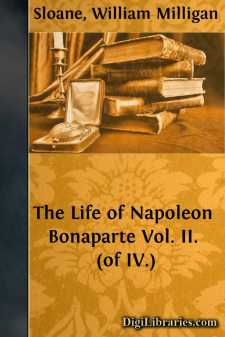Categories
- Antiques & Collectibles 13
- Architecture 36
- Art 48
- Bibles 22
- Biography & Autobiography 813
- Body, Mind & Spirit 142
- Business & Economics 28
- Children's Books 15
- Children's Fiction 12
- Computers 4
- Cooking 94
- Crafts & Hobbies 4
- Drama 346
- Education 46
- Family & Relationships 57
- Fiction 11828
- Games 19
- Gardening 17
- Health & Fitness 34
- History 1377
- House & Home 1
- Humor 147
- Juvenile Fiction 1873
- Juvenile Nonfiction 202
- Language Arts & Disciplines 88
- Law 16
- Literary Collections 686
- Literary Criticism 179
- Mathematics 13
- Medical 41
- Music 40
- Nature 179
- Non-Classifiable 1768
- Performing Arts 7
- Periodicals 1453
- Philosophy 64
- Photography 2
- Poetry 896
- Political Science 203
- Psychology 42
- Reference 154
- Religion 513
- Science 126
- Self-Help 84
- Social Science 81
- Sports & Recreation 34
- Study Aids 3
- Technology & Engineering 59
- Transportation 23
- Travel 463
- True Crime 29
The Life of Napoleon Bonaparte Vol. II. (of IV.)
Description:
Excerpt
The fine charter with which France had presumably closed the revolutionary epoch, in order to live for the first time under a constitutional government, was about to display its fatal weakness in the production of a deadlock. This possibility had been clearly foreseen by acute observers, since there was no provision for the control of one arm of the government by the other, and in any working system supreme control must reside somewhere. For fear of usurpation, anarchy, and tyranny the constitution of the Directorate divided the powers so completely that they could not work at all. The spring elections of 1797 were the first held under this new constitution without any restrictions, and the Jacobin majority in the legislature disappeared. Barthelemy, the new director chosen to replace Letourneur, was a moderate democrat with royalistic leanings, who, like his predecessor, joined his fortunes with those of Carnot. The Five Hundred, therefore, as well as the Ancients, now represented the great majority of the French people, who hated Jacobinism, who were opposed to any republican propaganda in foreign countries, and who, more than anything else, wanted peace, in order to restore their fortunes and to secure leisure for their amusements. An attack on the executive policy which had been dictated by the three radical members of the Directory, sometimes designated the triumvirate, at once began. Nothing escaped: assaults were made on their attitude toward the emigrants and the clergy, on their loss of the colonies, on their financial failures, and, above all, on their conduct of foreign affairs, which appeared to have as its aim the continuance of the war, and the overthrow of monarchy throughout Europe. The leaders of the majority in the two councils frequented a club in the Clichy quarter of Paris, which was the center of royalist intrigue. Though no match in ability for their opponents, these men were quite clever enough to taunt the directors with their impotence to stop royalist agitations. Internal affairs were desperate. Suicides from starvation were sadly frequent among the officers of the navy, while their colleagues in the Army of Italy were not only growing rich on plunder, but defiant as well. The French commander in Italy had first made peace on his own terms, and had then declared war without consulting the chambers, thus not only annihilating friendly commonwealths, but evincing a contempt for the constitution, for the duly elected representatives of the people, and for the popular demand that there should be, not a particular, but a general pacification. On June twenty-third, 1797, in a memorable interpellation of the government by Dumorlard, all these matters were thoroughly ventilated in the Five Hundred. Even Pontecoulant, Bonaparte's former protector, joined in the demand for an explanation. Paris and the country in general were left in a ferment.
The disorders, murmurs, and menaces so rife in Paris had long given food for thought to the proconsul at Montebello. He was meditating upon constitutions and their values, while outwardly devoting himself to fascinating his little court and its visitors. He rode, he danced, he told weird tales at dusk, he played cards and cheated with merry effrontery; in the intervals he slept long and deep, as at irregular hours he worked titanically and efficiently. Was it to maintain the chaos in Paris that he was conquering, administering, negotiating? This he flatly asked of Miot de Melito and Melzi, as they narrate. The directors were meditating a state stroke, and they well knew that Bonaparte was less their man than they were his creatures. So they chose a new ministry which included Talleyrand as minister of state and Hoche as minister of war. The role to be played by the latter was so evident that the plan was thwarted on a technicality, as will be seen; and with Talleyrand, Bonaparte was soon to be, if he were not already, in personal correspondence about forms of government. Interested experts will note the various suggestions from the medieval constitutions of Italian republics, which in some measure affected the conceptions of these political theorists.
It was with reference to such conditions that the celebration, in Milan, of July fourteenth was arranged. Each detail was nicely calculated to strengthen the self-esteem of every soldier, to intensify his military pride, and to prejudice him against the conservatives who wanted peace only that they might restore the monarchy. The soldiers of Bonaparte were in their own estimation the soldiers of the same republic which survived in the triumvirate, Barras, Rewbell, and Larevelliere; and it was a republican constitution which was menaced by the illegal interference of the legislature with the executive. In such a crisis it was easy to confuse in the minds of plain men the love of military glory with the enthusiasm for liberty. "Soldiers, I know that you are deeply moved by the misfortune which threatens our country"âso ran the proclamation of their idolized general. "But our country is in no real danger. The men who have enabled her to triumph over united Europe are on hand. Mountains separate us from France: you would surmount them with the swiftness of the eagle, if it were needful, in order to maintain the constitution, to defend liberty, to protect the government and the republicans. Soldiers, the government guards the law of which it is the depositary. If royalists show their heads, that moment is their last. Dismiss your fears, and let us swear by the spirit of the heroes who have fallen at our side in defense of libertyâlet us swear by our new banners: 'Never-ending war on the enemies of the republic, and of the constitution of the year III.'"
This call had exactly the effect desired. From the divisions of the army, and from the chief garrisons, came addresses declaring the adhesion of the troops to the principles of the Revolution....




